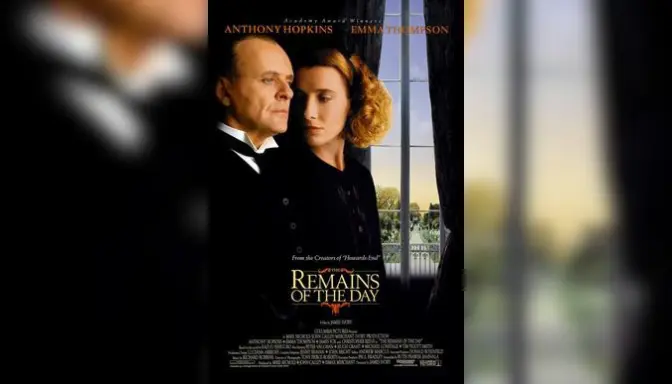Diksia.com - The Remains of the Day is a novel by Kazuo Ishiguro, a Nobel Prize-winning British author of Japanese origin. The novel was published in 1989 and won the Booker Prize for Fiction in the same year. It tells the story of Stevens, a butler who has devoted his life to serving Lord Darlington, a British aristocrat who was involved in Nazi appeasement before the Second World War.
In 1956, Stevens embarks on a road trip to visit Miss Kenton, a former housekeeper at Darlington Hall, who he believes might be unhappy in her marriage. Along the way, he reflects on his past and the meaning of his profession, as well as his relationship with Miss Kenton, whom he secretly loved but never confessed his feelings to.
The novel is widely regarded as one of the best works of contemporary literature, praised for its subtle and elegant style, its complex and nuanced characters, and its exploration of the themes of love, loyalty, and dignity. The novel also raises questions about the role of individual responsibility and moral choice in history, as well as the effects of social class and cultural differences on human relationships.
The novel has been adapted into a film in 1993, directed by James Ivory and starring Anthony Hopkins and Emma Thompson, which received eight Academy Award nominations. The novel has also been adapted into a stage play, a radio drama, and an opera.
In this article, we will examine the main aspects of the novel, such as its plot, its characters, its themes, and its reception. We will also compare and contrast the novel with its film adaptation, and discuss the relevance and significance of the novel in today’s world.
Plot Summary
The novel is narrated by Stevens, the butler of Darlington Hall, a stately home in the English countryside. The novel is divided into eight sections, each corresponding to a day of Stevens’ road trip in 1956. The novel alternates between the present and the past, as Stevens recalls the events that took place at Darlington Hall in the 1920s and 1930s, when he served Lord Darlington, a wealthy and influential gentleman who hosted several important political meetings and conferences.
Stevens also remembers his interactions with Miss Kenton, the housekeeper who joined Darlington Hall in 1922 and left in 1938, after getting married to a former colleague.
The novel begins with Stevens receiving a letter from Miss Kenton, who now lives in Cornwall with her husband, Mr. Benn. The letter suggests that Miss Kenton might be dissatisfied with her marriage and might be interested in returning to Darlington Hall, which has been sold to an American businessman, Mr. Farraday, after Lord Darlington’s death. Stevens decides to take advantage of Mr. Farraday’s offer to borrow his car and take a vacation, and sets out to visit Miss Kenton and possibly persuade her to come back.
On his way, Stevens stops at various places, such as Salisbury, where he meets a friendly stranger who advises him to enjoy his life; Taunton, where he visits the Taylor family, who used to work at Darlington Hall; and Little Compton, where he meets Dr. Carlisle, a former acquaintance of Lord Darlington. At each stop, Stevens reflects on his past and the events that shaped his life and career.
Stevens recalls how he dedicated himself to the service of Lord Darlington, whom he admired and respected for his noble ideals and his sense of duty. He also recalls how he tried to maintain a professional and dignified demeanor, even in the face of personal and emotional challenges, such as the death of his father, who was also a butler; the dismissal of two Jewish maids, who were fired by Lord Darlington under the pressure of Nazi guests; and the growing attraction between him and Miss Kenton, who often challenged and teased him, but also supported and cared for him.
Stevens also remembers how Lord Darlington’s reputation and influence declined over the years, as his involvement in Nazi appeasement and his sympathy for Germany became more evident and controversial. Stevens witnesses how Lord Darlington is manipulated and deceived by his German friends, such as Herr Ribbentrop, the German ambassador, and Herr Dupont, a French aristocrat who is secretly a Nazi agent. Stevens also sees how Lord Darlington is criticized and ridiculed by his British peers, such as Sir David Cardinal, a journalist, and Mr. Lewis, an American congressman, who accuse him of being naive and traitorous.
Stevens, however, remains loyal and faithful to Lord Darlington, even after the war, when he is confronted by Lord Darlington’s godson, Mr. Cardinal, who reveals that Lord Darlington was part of a secret plot to overthrow the British government and make peace with Hitler.
Stevens finally arrives at Weymouth, where he meets Miss Kenton at a hotel. He learns that Miss Kenton has reconciled with her husband, who had left her for another woman, but has returned after being diagnosed with cancer. Miss Kenton tells Stevens that she is happy with her marriage and her family, and that she has no intention of leaving them.
She also confesses that she had loved Stevens, but that she had given up on him after realizing that he would never express his feelings for her. She asks Stevens if he had ever loved her, but he evades the question. They part on friendly terms, but with a sense of regret and sadness.
Stevens returns to Darlington Hall, where he meets Mr. Farraday, who welcomes him back and jokes with him. Stevens realizes that he has wasted his life in the service of a misguided and disgraced man, and that he has missed his chance to be happy with Miss Kenton.
He also realizes that he has failed to live up to his own standards of dignity and professionalism, and that he has been too rigid and reserved. He decides to try to change his attitude and to adopt a more relaxed and humorous manner, as Mr. Farraday expects from him. He also decides to look forward to the future, rather than dwell on the past, and to make the best of the remains of his day.
Characters
The novel features a number of characters, both fictional and historical, who play a role in the story. The main characters are:
Stevens
The protagonist and narrator of the novel. He is the butler of Darlington Hall, a position he has held for over thirty years. He is a loyal, diligent, and proud servant, who strives to achieve the highest standards of his profession. He is also a repressed, reserved, and emotionally detached man, who denies his own feelings and opinions, and follows his employer’s orders without question.
He is in love with Miss Kenton, but he never admits it to himself or to her. He is also blind to the moral and political implications of Lord Darlington’s actions, and remains faithful to him even after his downfall. He is a tragic and sympathetic character, who represents the values and the dilemmas of a bygone era.
Miss Kenton
The former housekeeper of Darlington Hall, and the object of Stevens’ affection. She is a warm, strong-willed, and intelligent woman, who often clashes with Stevens over their different approaches to their work and their personal lives. She is also a caring and compassionate person, who tries to help and comfort Stevens, as well as the other staff and guests at Darlington Hall.
She is in love with Stevens, but she becomes frustrated and hurt by his coldness and indifference. She eventually marries Mr. Benn, a former colleague, and leaves Darlington Hall. She later regrets her decision, and writes to Stevens, hoping to rekindle their relationship. She is a complex and realistic character, who represents the possibilities and the limitations of love and happiness.
Lord Darlington
The former owner of Darlington Hall, and Stevens’ employer. He is a wealthy and influential aristocrat, who is involved in international affairs and diplomacy. He is a noble, generous, and idealistic man, who believes in the values of honor, justice, and peace.
He is also a naive, misguided, and gullible man, who is influenced and deceived by his Nazi friends, and becomes a supporter of appeasement and fascism. He is a controversial and tragic character, who represents the failures and the consequences of a misguided nobility.
Other characters include:
Mr. Farraday
The current owner of Darlington Hall, and Stevens’ new employer. He is a rich and jovial American businessman, who has a casual and friendly attitude towards Stevens and the other staff. He encourages Stevens to take a vacation and to adopt a more relaxed and humorous manner. He is a contrast and a challenge to Stevens, who represents a different culture and a different era.
Mr. Benn
Miss Kenton’s husband, and a former colleague of Stevens and Miss Kenton. He is a decent and ordinary man, who loves Miss Kenton, but also neglects and cheats on her. He leaves her for another woman, but returns to her after being diagnosed with cancer. He is a minor and ambiguous character, who represents the difficulties and the compromises of marriage.
Mr. Cardinal
Lord Darlington’s godson, and a journalist. He is a cynical and outspoken man, who opposes and exposes Lord Darlington’s involvement in Nazi appeasement.
Themes
The novel explores several themes, such as:
Love
The novel depicts the love story between Stevens and Miss Kenton, who are both deeply in love with each other, but are unable to express their feelings or act on them. Their love is hindered by their professional duties, their social norms, their personal insecurities, and their historical circumstances.
Their love is also contrasted with the love of other characters, such as Mr. and Mrs. Benn, who have a troubled but enduring marriage; Lord Darlington and Miss Kenton’s aunt, who have a brief but passionate affair; and Mr. Lewis and Mrs. Wakefield, who have a casual and open relationship. The novel shows the different forms and outcomes of love, as well as the joys and sorrows that it brings.
Loyalty
The novel examines the concept of loyalty, especially in relation to one’s employer and one’s country. Stevens is loyal to Lord Darlington, whom he serves faithfully and obediently, even when he disagrees or doubts his actions. Stevens believes that loyalty is a virtue and a duty, and that it is the mark of a great butler.
However, his loyalty also blinds him to the moral and political consequences of Lord Darlington’s involvement in Nazi appeasement, and prevents him from pursuing his own happiness with Miss Kenton. Stevens’ loyalty is also contrasted with the loyalty of other characters, such as Miss Kenton, who leaves Lord Darlington after he fires the Jewish maids; Mr. Cardinal, who exposes Lord Darlington’s treachery; and Mr. Lewis, who criticizes Lord Darlington’s loyalty to Germany. The novel questions the limits and the costs of loyalty, as well as the conflicts and the choices that it entails.
Dignity
The novel explores the notion of dignity, especially in relation to one’s profession and one’s self. Stevens defines dignity as the ability to maintain a professional and composed demeanor, even in the face of adversity and emotion. He considers dignity as the essence and the goal of his profession, and as the quality that distinguishes a great butler from a mediocre one.
However, his dignity also isolates him from his own feelings and opinions, and makes him appear cold and aloof to others. His dignity also prevents him from expressing his love for Miss Kenton, and from admitting his mistakes and regrets.
Stevens’ dignity is also contrasted with the dignity of other characters, such as Miss Kenton, who shows her emotions and opinions freely; Lord Darlington, who loses his dignity and reputation after his involvement in Nazi appeasement; and Mr. Farraday, who has a relaxed and humorous attitude towards life. The novel challenges the meaning and the value of dignity, as well as the balance and the harmony that it requires.
Reception
The novel received critical acclaim and commercial success upon its publication. It was praised for its subtle and elegant style, its complex and nuanced characters, and its exploration of the themes of love, loyalty, and dignity. It was also admired for its historical and political insights, as well as its psychological and moral depth.
The novel won the Booker Prize for Fiction in 1989, and was shortlisted for the Whitbread Novel Award and the Irish Times-Aer Lingus International Fiction Prize. The novel was also included in several lists of the best books of the 20th century, such as the Modern Library 100 Best Novels, the Time 100 Best English-language Novels from 1923 to 2005, and the BBC’s The Big Read.
The novel also received a positive response from the general public, who found the novel engaging, moving, and thought-provoking. The novel sold over a million copies in the UK, and was translated into several languages, such as French, German, Spanish, Italian, and Japanese.
The novel also inspired many readers to visit the locations featured in the novel, such as Salisbury, Taunton, and Weymouth, as well as the stately homes that served as models for Darlington Hall, such as Powderham Castle, Dyrham Park, and Badminton House.
The novel also generated some controversy and debate, especially in relation to its portrayal of Lord Darlington and his involvement in Nazi appeasement. Some critics and historians argued that the novel was too sympathetic and forgiving towards Lord Darlington, and that it downplayed or ignored the atrocities and the horrors of Nazi Germany.
They also claimed that the novel was inaccurate and misleading in its depiction of the historical events and figures, such as the Munich Agreement, the German ambassador, and the French aristocrat. They also accused the novel of being anti-British and anti-American, and of glorifying the old and decadent aristocracy.
Other critics and historians defended the novel, and argued that the novel was not a historical or political account, but a literary and artistic work, that explored the human and moral dimensions of the story, rather than the factual and historical ones. They also praised the novel for its nuanced and balanced portrayal of Lord Darlington, and for its recognition and respect of the complexity and diversity of the historical and political context.
Comparison with the Film Adaptation
The novel was adapted into a film in 1993, directed by James Ivory and starring Anthony Hopkins and Emma Thompson as Stevens and Miss Kenton. The film was also a critical and commercial success, and received eight Academy Award nominations, including Best Picture, Best Director, Best Actor, and Best Actress.
The film was also praised for its faithful and respectful adaptation of the novel, and for its superb performances, cinematography, and music.
The film, however, also made some changes and additions to the novel, such as:
- The film added a prologue and an epilogue, set in 1958, that showed Stevens meeting Mr. Farraday for the first time, and returning to Darlington Hall after his meeting with Miss Kenton.
- The film omitted some of the characters and scenes from the novel, such as the Taylor family, Dr. Carlisle, and the friendly stranger.
- The film changed some of the details and the chronology of the events, such as the date and the location of the Nazi conference, the death and the funeral of Stevens’ father, and the dismissal and the departure of the Jewish maids.
- The film emphasized and enhanced some of the emotional and dramatic aspects of the story, such as the tension and the attraction between Stevens and Miss Kenton, the conflict and the betrayal between Lord Darlington and Mr. Cardinal, and the regret and the sadness of Stevens and Miss Kenton at the end.
The film also added some scenes and dialogues that were not in the novel, such as:
- The scene where Stevens and Miss Kenton listen to the radio broadcast of the Munich Agreement, and Miss Kenton expresses her disappointment and anger at Lord Darlington’s role in it.
- The scene where Stevens and Miss Kenton dance together in the kitchen, and Miss Kenton tries to kiss Stevens, but he pulls away.
- The scene where Stevens and Miss Kenton have a heated argument over a book that Stevens is reading, and Miss Kenton accuses him of being ignorant and heartless.
- The scene where Stevens witnesses Lord Darlington breaking down and crying in his study, after being exposed and humiliated by Mr. Cardinal.
- The scene where Stevens and Miss Kenton have a final conversation at the hotel, and Miss Kenton asks Stevens if he ever loved her, and he says that he cannot answer that question.
The film also changed some of the dialogues and the expressions of the characters, such as:
- The dialogue where Stevens tells Miss Kenton that he is going to visit his father, who is dying, and Miss Kenton says that she is sorry, and that she hopes he will be all right.
- The dialogue where Stevens tells Miss Kenton that he is going to write a letter to Mr. Benn, and Miss Kenton says that she is happy for him, and that she hopes he will find happiness.
- The expression where Stevens smiles and laughs for the first time, after Mr. Farraday makes a joke about his driving skills.
Relevance and Significance of the Novel
The novel is relevant and significant for several reasons, such as:
- The novel is a masterpiece of literature, that showcases the skill and the artistry of Kazuo Ishiguro, one of the most acclaimed and influential writers of our time. The novel is a testament to the power and the beauty of language, and to the creativity and the imagination of the human mind.
- The novel is a timeless tale of love and loyalty, that touches the hearts and the souls of the readers, and that resonates with their own experiences and emotions. The novel is a celebration of the human spirit, and of the values and the virtues that make us human.
- The novel is a historical and political reflection, that sheds light and insight on the events and the issues that shaped the 20th century, and that still affect the 21st century. The novel is a challenge and a reminder to the readers, to think critically and ethically about their role and their responsibility in history, and in the world.
Conclusion
The Remains of the Day is a novel that captivates and enlightens the readers, with its rich and refined language, its compelling and complex characters, and its profound and poignant themes. The novel is a remarkable achievement of literature, that showcases the talent and the vision of Kazuo Ishiguro, one of the most celebrated and influential writers of our time. The novel is also a timeless tale of love and loyalty, that touches the hearts and the souls of the readers, and that resonates with their own experiences and emotions.
The novel is also a historical and political reflection, that sheds light and insight on the events and the issues that shaped the 20th century, and that still affect the 21st century. The novel is a challenge and a reminder to the readers, to think critically and ethically about their role and their responsibility in history, and in the world.
The Remains of the Day is a novel that deserves to be read and appreciated by everyone, as it offers a unique and unforgettable literary and human experience. The novel is a novel that will stay with the readers, long after they finish reading it, and that will inspire them to live and to love, with dignity and with grace. The novel is a novel that will make the readers cherish and enjoy the remains of their day.






